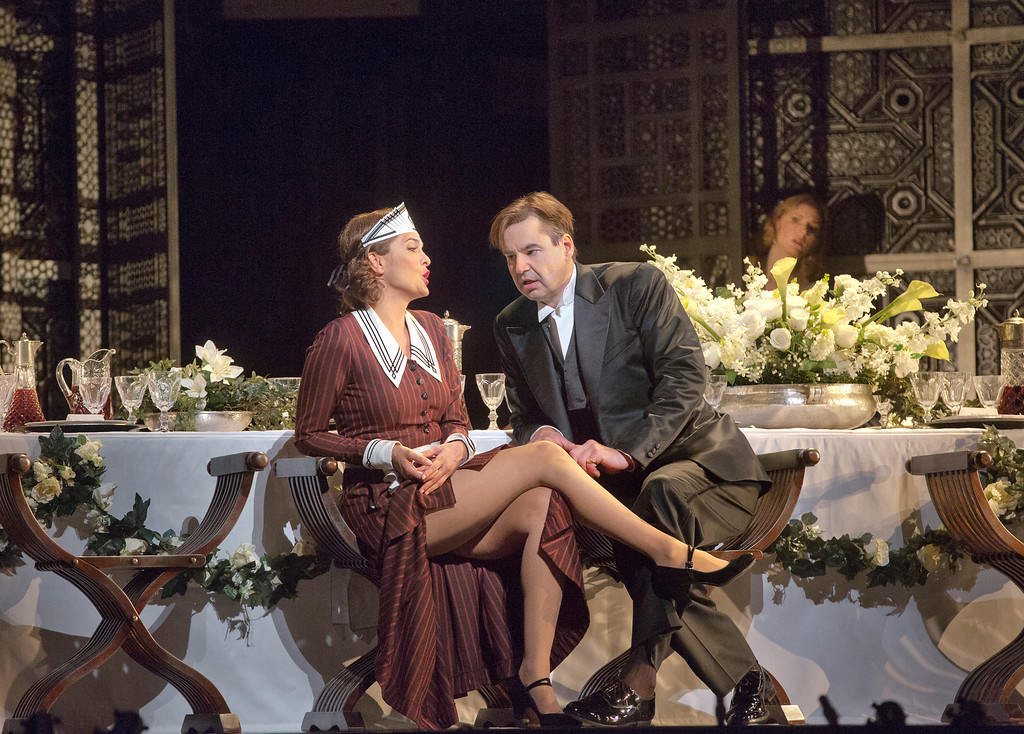No class (struggle) act but terrific cast shines in Met’s season-opening “Figaro”

Marlis Petersen as Susanna and Peter Mattei as the Count in Mozart’s “Le nozze di Figaro” at the Metropolitan Opera. Photo: Ken Howard
After a summer of difficult and often hostile wrangling over labor issues, the Metropolitan Opera opened its 2014-15 season Monday night with Mozart’s Le Nozze di Figaro, a serendipitously symbolic event. Not only is it the greatest opera ever composed, but its dramatic and musical reconciliation of the aristocracy with the lower classes, and the aristocrats amongst themselves, provides an apt coda to this summer’s story of labor and management strife.
There was more drama behind the scenes in the negotiating rooms than onstage in this smoothly efficient, comfortingly bland new production created by Sir Richard Eyre. Set in an abstracted 1930s English social milieu that might be familiar to viewers of Upstairs, Downstairs, Sir Richard directs the action in a way that puts the entire conceptual weight on the sex-farce aspect of Figaro, and subsumes the class antagonisms: less Waugh, more Wodehouse. The result is still funny, because the opera is funny and many of the performers have a comic gift; if the staged experience leaves little impression, much of the singing does.
Figaro is unusual in that it has five fully fleshed-out main characters, and four out of five were realized exceptionally well. As Figaro, bass Ildar Abdrazakov takes the final bow, but the great baritone Peter Mattei, as Count Almaviva, was the de facto lead. This was mainly due to his singing and acting—his voice is beautiful and strong, his phrasing is creamily effortless, and his uniquely casual stage manner is ideal for comedy. His is also the first main character to appear on stage: during the overture, a young woman comes running out from the murk of the back of the stage, gathering her clothes, while Almaviva saunters behind her, barefoot and wearing a short, red robe. What goes on in that bedroom?
As the overture spins along, the stage rotates. The design presents the Count’s castle, which turns to reveal various rooms and even the fifth—act garden. Built out of what appears to be wrought iron, coated in a faded nickel-plating, the turrets also look like crowns. The set isn’t pretty, but it carries a symbolic utility, left unexploited by the staging. There is a lot of coming and going through doorways, but that’s the plot—here the Count is a genial buffoon, without an imperious bone in his body, his servants and courtiers are his friends and neighbors.
His foils are Figaro, soprano Marlis Petersen as Susanna, and soprano Amanda Majeski in her Met debut as the Countess Almaviva. Abdrazakov and Petersen are terrific singers as well as terrific comedians, Petersen is especially fine with her screwball physicality.
Finer still was mezzo-soprano Isabel Leonard, whose Cherubino is one of the finest trouser-role performances in memory. Her singing is full and clear as a bell, and the way she stands and moves around is completely boyish yet masculine. She’s hilarious in both the second act, when Susanna and the Countess disguise the character in drag, and in the last act, when Cherubino is drunk and charmingly pugnacious.
Majeski is a talented artist but seems miscast as the Countess. She has a fine, golden soprano voice, but her fluttery vibrato works against some of the music. When the character is agitated, like in Act III’s “E Susanna non vien,” her expression is perfect, but the more tender sentiments—mostly famously “Porgi amor”—come off without nuance, expressing more formality than experience. But she conveyed a believable love for her husband.
The clownish Bartolo (bass John Del Carlo), the scheming Marcellina (mezzo Susanne Mentzer), the obsequious Don Basilio (tenor Greg Fedderly) are all, in the context of the staging, striving petite bourgeoisie. Figaro is dressed elegantly throughout, the highest class of butler, placing the character somewhere completely outside of social status. But the Count has nothing to separate himself in terms of class from the others. Even when he is trying to seduce Susanna while wearing a morning coat, he seems less entitled than harmless and befuddled. The inherent satire of Beaumarchais’ play, amplified by da Ponte’s perfect libretto, barely glimmers.
Conductor James Levine set a vivacious pace with the overture, but struggled to maintain it through most of the first three acts. There was constant miscoordination with the singers, most of whom suffered from a strange entropy that had them slowing down their phrases (Abdrazakov and Del Carlo at times sounded as if they were singing ab libitum), then scrambling to catch up, with Levine vainly trying to follow their lead. Something had to give, and Levine, in the last two acts, figured out a way to keep pace with the singers. (The recitatives, though, were fine throughout, harpsichordist Robert Morrison responding with razor-fine alacrity.)
The coordination issues threw off some of Mozart’s great ensembles, especially the beautiful quartet in the second act and the amazing septet that follows, with the vocal lines and musical expression growing foggy and indistinct. This is particularly damaging in Mozart, whose music is more companionship for the singers than mere accompaniment, with strings and winds responding to the voice and completing the singers’ phrases.
One of the most successful musical moments was Barbarina’s “L’ho perduta,” sung beautifully by soprano Ying Fang.
An evening of great moments but shaky extended scenes. All is fair in love, perhaps, and for this Met opening night, that was good enough.
Le nozze di Figaro continues through December 20. From December 4, Edo de Waart conducts with a new cast of Erwin Schrott, Danielle de Niese, Mariusz Kwiecien, Rachel Willis-Sørensen, and Serena Malfi metopera.org.
Posted Sep 24, 2014 at 2:43 pm by Jacqueline
George wrote:
“Not only is it the greatest opera ever composed”
C’mon, do you really believe this??!!